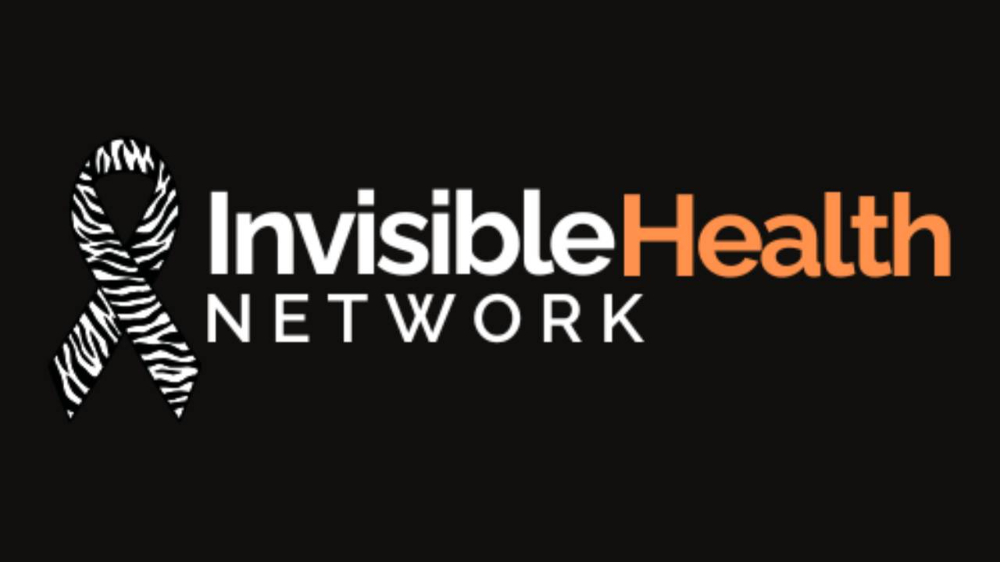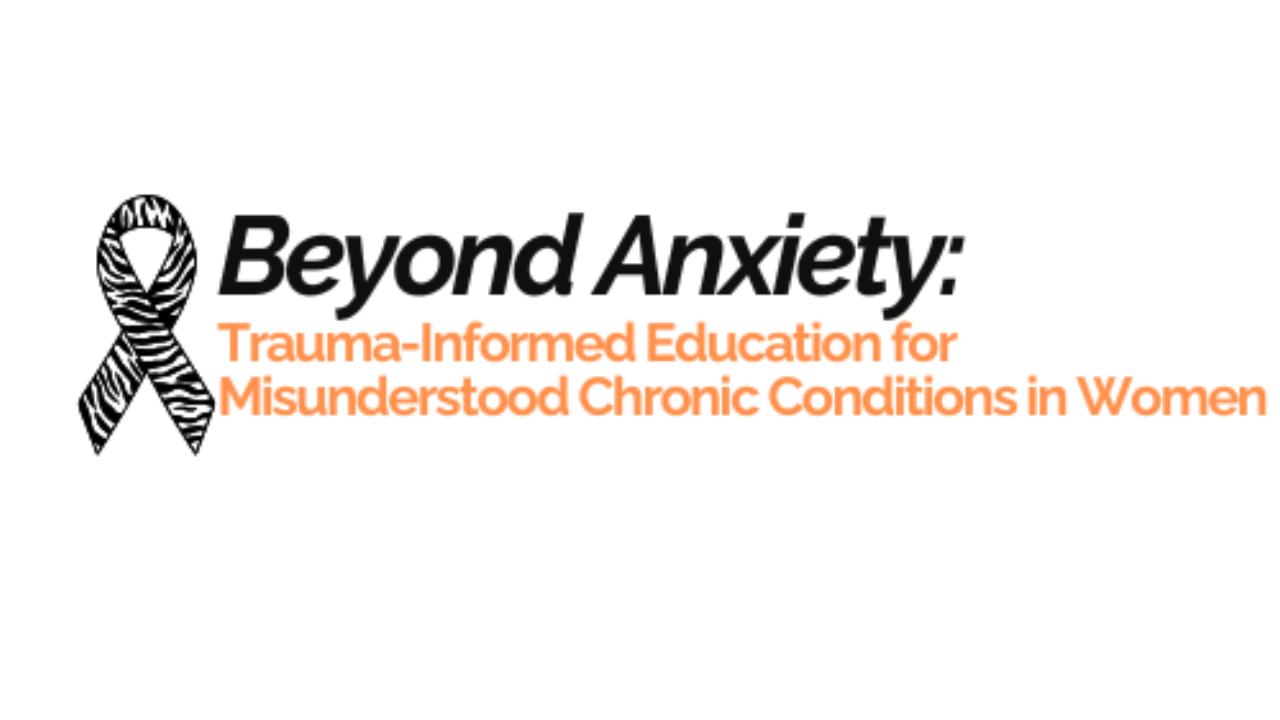Beyond Anxiety:
Trauma-Informed Education for Misdiagnosed and Misunderstood Chronic Conditions
The Beyond Anxiety professional development training is an evidence-based, targeted training for health providers. It is designed to close critical gaps in the understanding, recognition, and response to complex, under-diagnosed, misunderstood, and often gender-biased health conditions that are generally hidden in plain sight, particularly those predominantly impacting females assigned at birth. These conditions are more common than expected, often confused with just being anxiety or purely psychological, and impact every aspect of life, including physical, psychological, and emotional health, in addition to social relationships, employment, and finances. There is often a complex interplay of hormones, trauma, neurodivergence, eating issues, and chronic conditions.
Patients are presenting with more complex symptoms with overlapping comorbidities—especially those involving dysautonomia, women’s pelvic pain, chronic pain, mental health, trauma, somatic symptoms, gut issues, and overlapping neurodivergent traits. These are becoming increasingly common, yet frequently misdiagnosed, dismissed, or misunderstood. This has led to rising complaints against providers, delayed diagnoses, and systemic issues of patient dissatisfaction and medical trauma. At the same time, providers are under mounting pressure to uphold a high standard of care while navigating depletion.
This training addresses the gap by equipping professionals with evidence-based strategies, trauma-informed approaches, and diagnostic literacy around commonly overlooked conditions, often first presenting in adolescence and into adulthood. It offers both clinical confidence and compassion—empowering health providers to reduce medical trauma, improve outcomes, and work sustainably across complex care settings. This training is also aligned with national health priorities by addressing critical gaps in diagnostic accuracy, gender-responsive care, and interdisciplinary capacity—supporting improved outcomes for complex, under-recognised conditions and enhancing workforce wellbeing. There is no known training or books similar to what this workshop covers. It is developed from clinical experience, evidence-based research, and lived experience.

Who is this Workshop For?
This training is suggested and not limited to:
- General practitioners and medical specialists
- Allied health professionals (e.g., psychologists, physios, occupational therapists, dietitians, social workers, nurses, etc.)
- Mental health clinicians, counsellors, and therapists
- NDIS and disability service providers
- Youth and education professionals
- Health service leaders and rural providers
Key Topics Covered
Learn to identify and understand more about some of the most commonly misdiagnosed, misunderstood or under-diagnosed conditions often confused with anxiety. They are complex, multi-systemic, with generally overlapping psychophysiology and often overlapping with neurodevelopmental disorders (such as Autism or ADHD) and some with disordered eating. These conditions predominantly impact females. It covers the signs, symptoms, overlapping comorbidities, and treatment options for each to raise awareness, build knowledge and case examples.
- Connective Tissue Disorders, for example, Hypermobility Spectrum Disorders/Ehlers-Danlos Syndrome
- Postural Orthostatic Tachycardia Syndrome (POTS)
- Gut/Digestive Issues
- Spontaneous Coronary Artery Dissection (SCAD)
- Endometriosis & Adenomyosis
Built upon the COMPASS-FIVE Model
This training introduces the COMPASS-FIVE: Interdisciplinary Framework for Complex Care (C5-IFCC), a research-based model focused on gaining skills in integrative care, trauma-informed communication, validation strategies, self-care, and managing diagnostic uncertainty in complex cases.
Learning Objectives
The learning objectives are aligned with key national strategic action plans, professional competencies, and with clinical practice. This training is suitable for Continuing Professional Development (CPD) and includes a self-reflection and a certificate of completion will be provided.
By the end of this training, participants will be more skilled to:
-
Improve recognition of complex multisystemic conditions—such as POTS, Ehlers-Danlos Syndrome, MCAS/gut issues, SCAD, and endometriosis—that are often mislabelled as anxiety or functional symptoms.
-
Apply a trauma-informed lens when assessing and responding to patients presenting with overlapping physical, psychological, and emotional symptoms.
-
Increase diagnostic literacy and confidence in identifying signs of under-recognised, gendered, and invisible conditions within a biopsychosocial framework.
-
Utilise a Framework to guide interdisciplinary decision-making, reduce medical trauma, and support sustainable care across complex cases.
-
Enhance patient-provider communication and validation strategies to reduce misdiagnosis, foster trust, and improve patient engagement and outcomes.
-
Develop strategies to support provider wellbeing, prevent burnout, and promote sustainable professional practice when working with complex and chronic care populations.
Strategic Alignment
This workshop aligns with major national health strategies, including:
🧭 Australian Women’s Health Strategy (2020–2030) – Empowers workforce capability in managing complex and under-recognised women’s health conditions
🧭 National Action Plan for Endometriosis – Bridges the clinical education gap
🧭 National Strategic Framework for Chronic Conditions – Equips professionals to manage overlapping chronic conditions
🧭 PHN Priority Areas – Supports early intervention and care navigation
🧭 National Medical Workforce Strategy (2021–2031) – Offers rural-ready, burnout-reducing solutions
🧭 AHPRA-aligned professional development standards
Why this Training is So Important
Medical Dismissal, Delayed Diagnosis & Medical Trauma is a Silent Epidemic
- Research shows that women’s health concerns are often minimised or misattributed to anxiety or emotional distress.
- Patients report being told it’s “just anxiety,” leading to years of untreated symptoms.
- Those with invisible or complex conditions—like endometriosis, POTS, Connective tissue disorders, ADHD, or autoimmune conditions—are particularly vulnerable to diagnostic bias.
Delayed Diagnosis Has Serious Consequences
- It takes an average of 7 years to diagnose endometriosis in Australia.
- In a recent national media investigation, nearly 60 women had cancer diagnosed too late due to systemic dismissal of symptoms.
- It can take 22 years for EDS to be diagnosed.
- Women are often underrepresented in medical research, leading to gaps in knowledge and care standards that delay accurate treatment.
Medical Trauma Is Real
- Repeated invalidation, misdiagnosis, and traumatic procedures create deep psychological wounds and loss of trust in the health system.
- Some women have been misdiagnosed with mental illness or medicated unnecessarily—while underlying physical conditions were ignored.
- Medical trauma often mirrors the impact of PTSD, affecting both physical and emotional wellbeing.
The Systemic Problem
- Gender bias in healthcare is everyone’s concern—it’s embedded in training, funding models, research priorities, and consultation times.
- Many conditions that predominantly affect women remain under-researched and under-treated.
- Current systems often fail to take into account the complex interplay of hormones, trauma, neurodivergence, and chronic conditions.
Your Educator
Nichi Morrin is a Clinical Psychologist, credentialed eating disorder clinician, board-approved supervisor and founder of The Invisible Health Network. Nichi has worked across public and private health settings, within severe mental health positions, rural mental health, First Nations health facilities, and university lecturing. Nichi has also had experience researching and publishing a book, plus has featured on A Current Affair and in Brainz Magazine. As a health educator with lived experience of complex conditions, she bridges patient and professional worlds with empathy, insight, and innovation.
Nichi actively researches and works clinically at Rewired Psychology Clinic. She is a passionate advocate leading the way in revolutionalising systemic changes to improve health care for those with complex mind-body conditions.

Register for the next Beyond Anxiety Training Workshop
📅 Wednesday 22nd October 2025
⏳ Time: 9:30am to 3:00pm, Delivered Virtually Online
🧭 Investment: $347 AUD
Click on the box to register and work towards closing the gap in healthcare
(Please make contact for pricing for large groups or organisations)
Join this evidence-based professional training to build clinical confidence, reduce misdiagnosis, and improve outcomes in complex care.
Transform your practice by improving skills, reducing misdiagnosis, reducing risk of complaints, improving patient outcomes, learning to focus also on your own self-care, and enhancing interdisciplinary care.
For further details email: [email protected]

